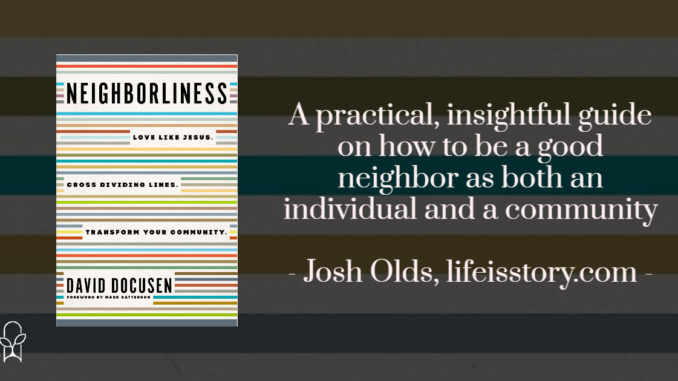
Published by Thomas Nelson on March 15, 2022
Genres: Non-Fiction, Christian Life
Buy on Amazon
Goodreads

Do you want to love your neighbor as yourself but don’t know where to start? This practical, accessible guide to bridging the dividing lines of politics, race, and economics, both individually and as the church, will help you amplify Jesus in your community and build God’s kingdom.
When asked what the greatest commandment is, Jesus gave a two-part answer: “Love the Lord your God with all your heart and with all your soul and with all your mind and with all your strength” and also “Love your neighbor as yourself.”
Love God. Love others.
Jesus’ simple command to love your neighbor can feel overwhelming when your neighbor looks, lives, and votes differently than you do. Racial and economic tensions across the country have resulted in deep dividing lines that seem really intimidating to cross.
Docusen breaks down these lines in approachable chapters, including topics like these:
how to actively seek out people you can benefit and encourage,what it means to find a diverse and supportive community that fulfills needs, examples of real-life experiences, including highlights and missteps of Docusen’s ongoing journey, andhow churches can teach on difficult topics with grace and truth.Neighborliness is a practical guide to bridging those dividing lines and learning to recognize and amplify the beauty of God in our communities. Backed by David’s speaking and training through the Neighborliness Center, this book will help individuals and churches reach out to their neighbors, love them through Christ, and build God’s kingdom.
“Who is my neighbor?”
That is the question the rich young ruler asked Jesus as a means of justifying himself. And in response, Jesus told the story of a very unlikely person being a very unlikely neighbor. For two thousand years, followers of Jesus have been trying to justify themselves by negotiating the meaning of “neighbor,” defining and redefining it until it means the kind of people just like whoever is asking the question. In Neighborliness, David Docusen seeks to rediscover the radical neighboring of Jesus, one that crosses dividing lines and transforms communities.
Part-memoir, part-blueprint, part-conversation, Neighborliness is a practical, insightful guide on how to be a good neighbor as both an individual and a community. Docusen is particularly considered about a multi-ethnic, multi-generational community of neighbors, so his immediate focus is on tearing down systems of supremacy and engaging in the hard work of reconciliation and building legacies that are transmitted one generation to the next.
I particularly appreciated the chapter on learning to lament. In the white evangelical church, in particular, the concept of lament has been lost to a theology of celebration. For much of the church, lament is a foreign concept entirely. Most Christians would pay lip service to reconciliation and be actively engaged in trying to create other elements of community, but the idea of lament is a crucial element of engaging with hurting communities. “Mourn with those who mourn,” Scripture says.
Each chapter ends with questions for discussion and reflection. I really like this aspect of the book because it invites community. While you can wrestle through these questions alone, they’re really meant to be worked over with a group, engaging in community as you grow and build community. That is, Neighborliness is part of the process it recommends, encouraging readers to engage in community with others.
Neighborliness is a good start. It’s a beginner’s book in the art of neighboring. There are any number of books that go down deeper when it comes to racial reconciliation, building multi-generational communities, engaging in lament, and so on. Docusen points you in the right direction, giving you the hunger to learn more as you see how implementing this neighborliness of Jesus will impact your communities—both your faith communities and the secular communities in which you reside.
